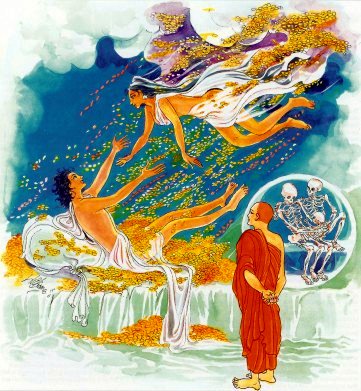Not by rain of golden coins
is found desires’ satiety,
desires are dukkha, of little joy,
thus a wise one understands.
Explanation: Insatiable are sensual desires. Sensual desires will not be satisfied even with a shower of gold. The wise knows that sensual pleasure bring but little satisfaction and much pain.
The Story of a Discontented Young Monk (Verses 186 & 187)
While residing at the Jetavana Monastery, the Buddha spoke these verses, with reference to a young monk who was discontented as a monk.
The story goes that after this monk had been admitted to the Sangha and had made his full profession, his preceptor sent him forth, saying, “Go to such and such a place and learn the Ordinances.” No sooner had the monk gone there than his father fell sick. Now the father desired greatly to see his son, but found no one able to summon him. When he was at the point of death, he began to chatter and prattle for love of his son. Putting a hundred pieces of money in the hands of his youngest son, he said to him, “Take this money and use it to buy a bowl and robe for my son.” In so saying, he died.
When the young monk returned home, his youngest brother flung himself at his feet, and rolling on the ground, wept and said, “Venerable, your father was praising you when he died and placed in my hand a hundred pieces of gold. What shall I do with it?” The young monk refused to take the money, saying, “I have no need of this money.” After a time, however, he thought to himself, “What is the use of living if I am obliged to gain my living by going from house to house for alms? These hundred pieces are enough to keep me alive; I will return to the life of a layman.”
Oppressed with discontent, he abandoned the recitation of the Sacred Texts and the Practice of Meditation, and began to look as though he had jaundice. The youths asked him, “What is the matter?” He replied, “I am discontented.” So they reported the matter to his preceptor and to his teacher, and the latter conducted him to the Buddha and explained what was the matter with him.
The Buddha asked him, “Is the report true that you are discontented?” “Yes, Venerable,” he replied. Again the Buddha asked him, “Why have you acted thus? Have you any means of livelihood?” “Yes, venerable.” “How great is your wealth?” “A hundred gold pieces, venerable.” “Very well; just fetch a few potsherds hither; we will count them and find out whether or not you have sufficient means of livelihood.” The discontented monk brought the potsherds. Then the Buddha said to him, “Now then, set aside fifty for food and drink, twenty-four for two bullocks, and an equal number for seed, for a two-bullock-plow, for a spade, and for a razor adze.” The result of the count proved that the hundred gold pieces would be insufficient.
Then said the Buddha to him, “Monk, the pieces of money which you possess are but few in number. How can you hope to satisfy your desire with so few as these? In times past lived men who exercised sway as universal monarchs, men who by a mere waving of the arms were able to cause a rain of jewels to fall, covering the ground for twelve leagues waist-deep with jewels; these men ruled as kings until thirty-six sakkas had died; and, although exercising sovereignty over the deities for so long, died, without having fulfilled their desires.”

